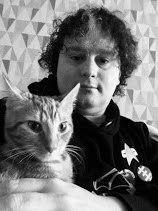Track of the Week: McCarthy: Should The Bible Be Banned (1988)
The 'C86' bands weren't renowned for their political dedication, but there's always an exception to the rule. A group of dedicated socialists led by lyricist and singer Malcolm Eden and guitarist Tim Gane, McCarthy - ironically named after the right-wing American politician - combined jangly indie pop with socialist politics. Malcolm Eden's lyrics are written from the point of view of various characters, and often seek to make a point of view look ridiculous by exposing the errors in the characters' thinking. Tim Gane's delicate guitar arpeggios often add another dimension of irony to these quite passionate songs. These elements give McCarthy's songs a subtlety that they would lack had Eden decided to merely fanatically espouse his own view points over storming punk rock. 'Should The Bible Be Banned' is an excellent song and a prime example of how McCarthy worked at their best. Rather then a direct attack on religion, the song is protesting about the religious right's censorship against freedom of expression on the grounds that songs, books or films that deal with violence are encouraging violence in children and are so corrupting our youth. The song opens with Eden assuming the persona of Dave, a young miscreant who has murdered his brother. In a neat rhetorical trick, as the song progresses it transpires that Dave was inspired to kill his hated brother not by violent video games or satanic death metal but by the story of Cain and Abel in the Bible. As a result, people start protesting in order to get the government to ban the Bible. The song closes with Dave revealing that the Home Secretary is investigating the possibilities of 'A copycat killer copying the Book of Genesis'. This obviously humorous image underlines the hypocrisy of religious groups seeking to ban violent forms of art - the Bible is full of violence, it is a natural part of human nature. And as the Christian fundamentalists' sacred text is on the receiving end of the banning, the song's target is doubly made the butt of the joke. The song also makes a more serious point - while Dave is inspired to kill his brother by the Bible, the real reason for his deranged hatred for his brother his revealed in the song to be due to the other son being the father's favourite - to the extent that Dave believes 'My father hated me'. By banning the Bible, the Home Secretary is taking the populist approach to blame a convenient scapegoat to keep voters happy rather then trying to deal with the real social conditions that caused the problem in the first place. The lyrics don't give you all of this on a plate though; Malcolm Eden wanted people to think for themselves about these issues rather then being force-fed other people's opinions.
Not that the song is merely a great set of lyrics; Tim Gane's shimmering guitars and Eden's pure, choirboy voice make the song instantly catchy and likeable. Upon McCarthy's 1990 split, Tim Gane would go on to form Stereolab and invent a truly individual melding of Krautrock motorik and 60s pop, and you can hear the germs of these experiments in McCarthy's songs, in the way that the guitar blurs into a heady rush. The rhythm section is endearingly shambolic though. After McCarthy's demise, Malcolm Eden would retire from music, claiming to be no longer interested. This is a shame, as he was a truly individual and perceptive lyricist who never patronised his audience. Fortunately though, Tim Gane formed Stereolab and became one of the greatest bands of the 90's, building on the promise of this sadly forgotten band.
Not that the song is merely a great set of lyrics; Tim Gane's shimmering guitars and Eden's pure, choirboy voice make the song instantly catchy and likeable. Upon McCarthy's 1990 split, Tim Gane would go on to form Stereolab and invent a truly individual melding of Krautrock motorik and 60s pop, and you can hear the germs of these experiments in McCarthy's songs, in the way that the guitar blurs into a heady rush. The rhythm section is endearingly shambolic though. After McCarthy's demise, Malcolm Eden would retire from music, claiming to be no longer interested. This is a shame, as he was a truly individual and perceptive lyricist who never patronised his audience. Fortunately though, Tim Gane formed Stereolab and became one of the greatest bands of the 90's, building on the promise of this sadly forgotten band.


0 Comments:
Post a Comment
<< Home